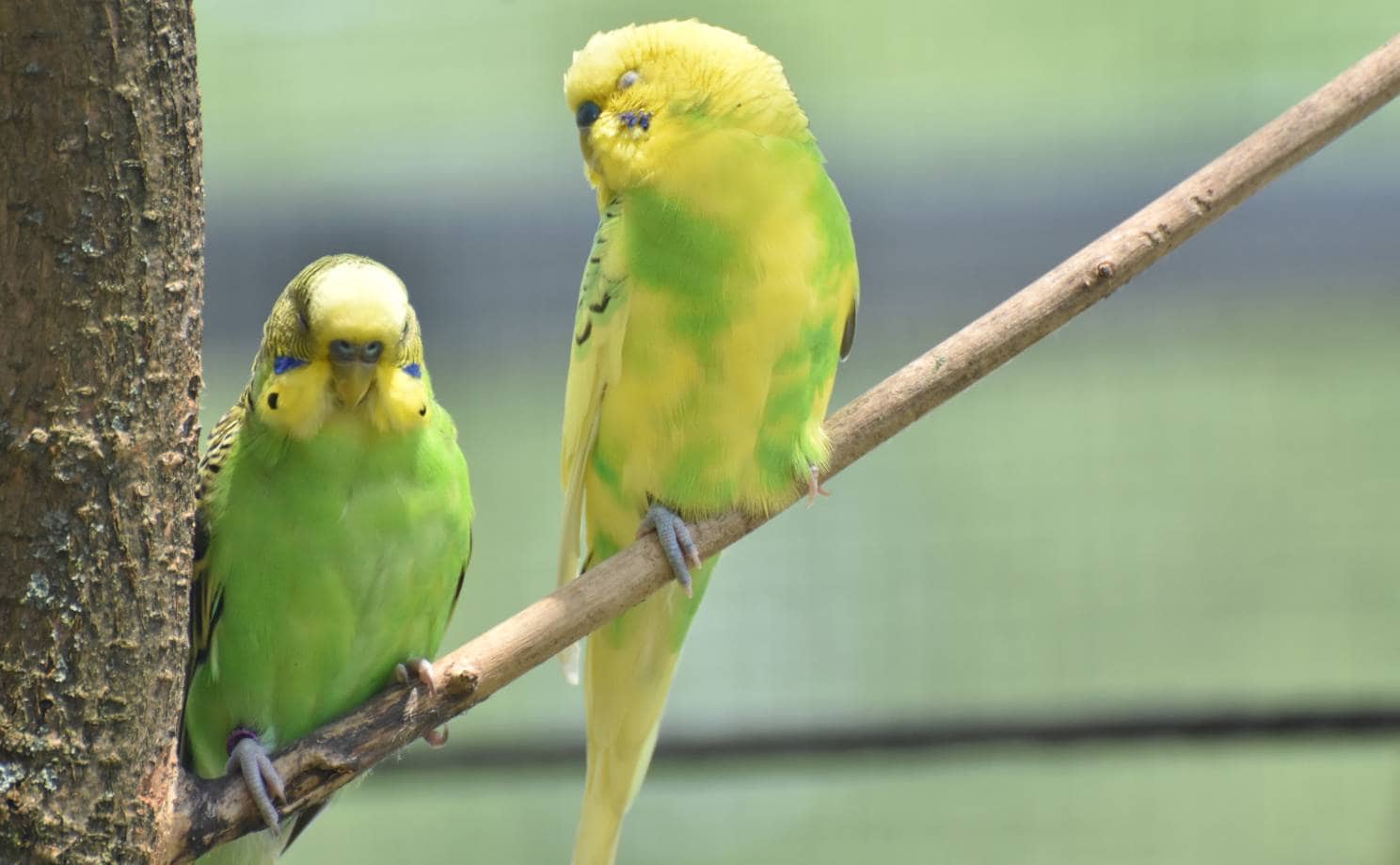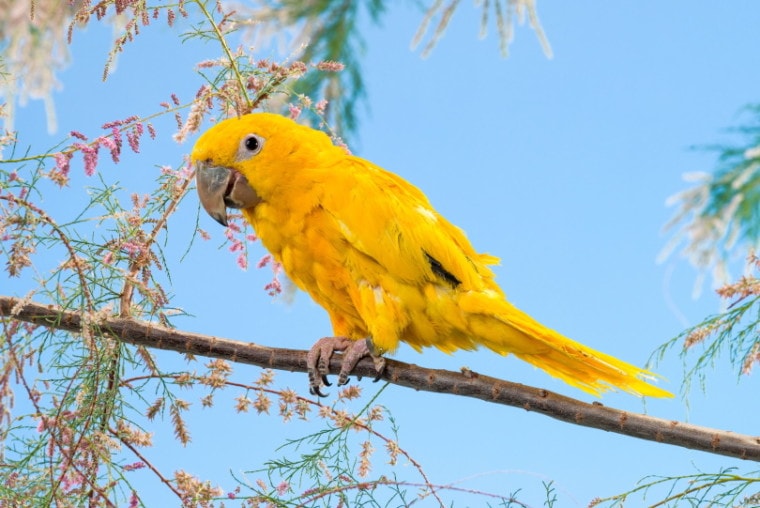
The golden conure truly lives up to its name. It is a beautiful, yellow bird that is also quite rare. They are well-known for being excellent pets, as they are easily tamable and quite affectionate. Many owners describe them as intelligent and entertaining to watch.
While these birds can make excellent pets, they are challenging to find. When you do find them, they are often quite expensive. They often cost thousands of dollars.
They are native to northeastern Brazil. However, they are only found in a few areas and are considered endangered. They are often difficult to find in the wild, as they are more solitary than other species.
 Golden Conure Overview
Golden Conure Overview
| Common Names: | Golden Conure |
| Scientific Name: | Guaruba guarouba |
| Adult Size: | 13 inches long |
| Life Expectancy: | 30 years |
Origin and History
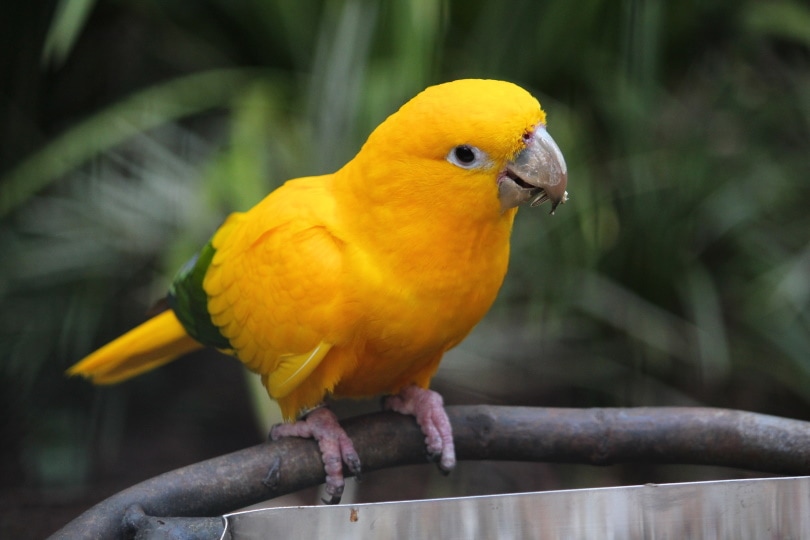
In the wild, these birds are considered endangered. They are only native to a small area south of the Amazon River. Despite their bright colors, they don’t form flocks. This behavior also makes them difficult to spot. They are decently social, though.
Not very much is known about their behavior in the wild, as they are challenging to study. They are thought to be nomadic and move within their small home area based on the season.
There are currently considered to be 3,000 golden conures left in the wild. However, some argue that this may be a vast underestimate and put the total closer to 6,600, some even claiming there are as many as 13,400. Their solitary behavior is likely why there are so few sightings.
Temperament
Golden conures are pretty active pets and enjoy climbing and chewing. They need a lot more room than some other birds for this reason. They aren’t made to sit around for much of the day, but they also require careful supervision when out of their cage. They are very curious and will get into things.
Golden conures are also extremely intelligent. They need lots of mental stimulation, or they can become very bored. They will often try to make their fun, which usually involves them doing something they aren’t supposed to. They are prone to destructive behaviors, especially when not properly socialized.
They are often described as a bit more sensitive than other birds. They are prone to stress and boredom. While this makes them a bit more interactive than some other birds, they also require more can and attention.
These birds can bond with multiple people and often enjoy a lot of affection. They often like cuddling and will get along with just about anyone when adequately socialized. They are a good choice for families, as they will often interact with all members. Usually, they are not aggressive except when they are breeding, making them quite needy.
Speech & Vocalizations
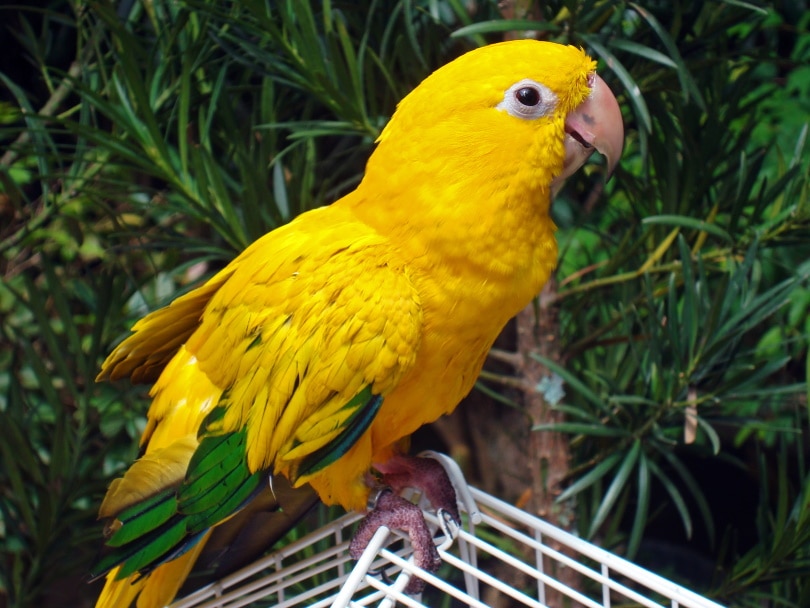
Like most conures, the golden conure is very vocal. They tend to make a lot of noise. They can produce screams, and many do regularly. They are poor choices for apartments and smaller homes, as well as anyone who is looking to avoid louder birds.
Their vocal behavior allows them to master a wide range of vocabulary. They can learn many different words. They are incredibly passionate about talking. If you’re looking for a bird that talks, this is probably one of the better options out there. However, if you’re looking for a quieter animal, this is not the best option for you.
Golden Conure Colors and Markings
This species has a relatively large head and beak. They look a bit like a macaw and are sometimes mistaken as such. However, their tail is much shorter than anything you’d find on a macaw.
As their name suggests, they are bright yellow over almost all of their body. The one expectation is the very end of their flight feathers, which are a darker green. Around their eyes is a bald ring, and both their legs and feet are pink.
Juveniles have more green on their feathers than adults. They often have green speckles throughout much of their body. They may have a duller color as well. They switch over to adult coloration gradually.
There are not many known variants of this species. They all pretty much look the same, though juveniles look a bit different from adults. Males and females look the same. You can’t have sex with them based on their appearance alone.
 Caring for the Golden Conure
Caring for the Golden Conure

These birds are a bit more complicated to care for than most. They need a lot of attention. It would be best if you planned on committing a lot of time to your bird. If you don’t have a few hours a day to be with your bird, you may want to avoid adopting them.
They work great in larger families where they will receive plenty of attention.
These pets are very interactive and exciting to watch. They don’t sit still for long and are always doing something. They can learn many fun tricks and enjoy talking to their people. Of course, you must be around to support this. Otherwise, they can become bored quite quickly.
Because of their higher activity level, they can’t be kept in their cage for long periods. However, their high intelligence means that they need to be supervised when out of the cage. Otherwise, they may get into something they aren’t supposed to. The cage also needs to be quite large, as they need plenty of room to move. Expect this bird to take up quite a bit of space.
They aren’t known to fly much in captivity. They usually don’t fly unless they need to, and this rarely arises. But they do a lot of acrobatics by climbing around and jumping.
These birds often like water. They enjoy baths and showers. These are required for the bird’s health, but they often get quite a lot of enjoyment out of them as well.
Common Health Problems

When cared for properly, these birds live a relatively long lifespan. The average lifespan in captivity is around 30 years. Be sure you can commit to caring for a bird for 30 or more years before you decide to adopt one.
These birds are usually quite hardy and not prone to many health problems. They are pretty healthy as long as they are taken care of properly. Usually, health problems are associated with improper care. If your bird gets sick often, it is likely because something in their environment is incorrect.
When they are stressed or bored, they may be prone to feather picking. This is a lot like humans picking at their fingernails. It isn’t necessarily a problem. However, some birds may push it to extremes and nearly go bald.
They may also be prone to respiratory problems. This can occur from too much or too little humidity in the air. Some birds are just more prone to respiratory problems than others.
Sinus inflammation and diarrhea can also occur. Usually, diarrhea is the result of an improper diet. However, illnesses can cause it as well.
Diet and Nutrition
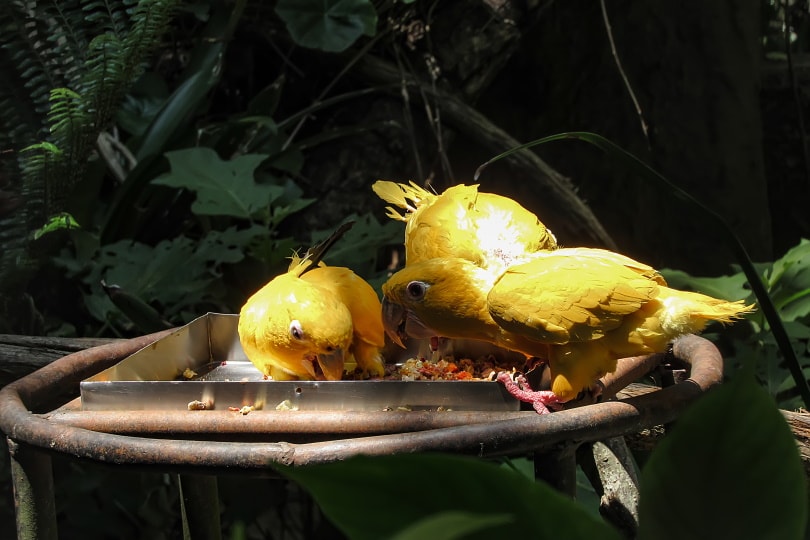
In the wild, these birds eat a varied diet. They may consume nearly anything that they can find, including fruits, vegetables, nuts, berries, and grain. They are considered opportunistic eaters, as they will consume whatever they happen to find that day.
You should aim to mirror this diverse diet in captivity. These birds do best on a varied diet that contains fruits, nuts, berries, and veggies. You can also feed them a high-quality commercial diet. However, you should also feed them plenty of suitable treats. They often don’t thrive best on pellets alone. Improving the diversity of their diet may help improve their overall lifespan and health.
These birds have been known to raid crops, including things like mangos. They may also eat the occasional insects or larva. However, it is generally not recommended to feed them insects in captivity, as fruit and veggies are often better for their health.
Exercise
The golden conure is very active. If you want them to be healthy and happy, letting them get plenty of activity is necessary. You should be able to spend three to four hours a day supervising your bird around your home so that they can exercise properly. They need to be supervised while out of their cage, as they tend to get into things.
They usually don’t fly in captivity simply because they don’t need to. But they absolutely can. Don’t expect them not to reach something just because you’ve put it out of reach.
Many people let their birds out in the evening when they return home. If you are home early enough, this may be plenty of exercise. However, it is best to spread out the busy time when possible.
These birds love to climb, so they will appreciate toys like ladders and ropes. They enjoy having something to climb around that challenges them, so we highly recommend investing in a good collection. Change them out regularly to ensure that the bird remains challenged and is unsure what to expect. Climbing the same thing likely won’t keep them entertained.
This species is also known for chewing. They have strong jaw muscles, so they can do a lot of damage if they wish. We recommend that you provide them with plenty of chew toys, or they will find their own things to chew on.
Where to Adopt or Buy a Golden Conure

These birds are challenging to find. They are endangered in the wild, and breeding can be difficult in captivity. They have a unique breeding pattern, where younger birds help adults. This can be difficult to replicate in captivity.
Their sales are significantly regulated around the world, including in the United States. If you wish to own one, then you will have to jump through a few hoops. The seller will need a permit to sell the bird, especially if they are in another state. Often, you’ll need to locate a breeder near you and stay on a waiting list for some time.
Because this is an endangered species, much captive breeding focuses on keeping these birds around—not necessarily on creating pets.
There are some birds available online. However, it is often impossible to ship these animals, so you will often need to travel to pick them up. It isn’t odd to find these birds for thousands of dollars, so plan accordingly. Most are around $7,000, not counting traveling costs.
 Conclusion
Conclusion
Golden conures can make great pets for the right person. They are very interactive and get along with most people. In many cases, they will bond equally with everyone, making them one of the few birds suitable for families.
However, these birds also require quite a bit of work. They are very interactive, which is excellent if you have plenty of time to interact with them. They need lots of exercise and often need to be let out of their cage for hours a day. If you want to spend lots of time with your bird, this is likely a good thing. If you’re already pressed for time, this probably isn’t the best option for you.
While these are some of the best birds, they are also expensive and difficult to find. We do not recommend them for beginner bird owners or those without much time on their hands. They are best for enthusiasts that have plenty of time for their unique care needs.
Featured Image Credit: LifetimeStock, Shutterstock
 Golden Conure Overview
Golden Conure Overview Caring for the Golden Conure
Caring for the Golden Conure


